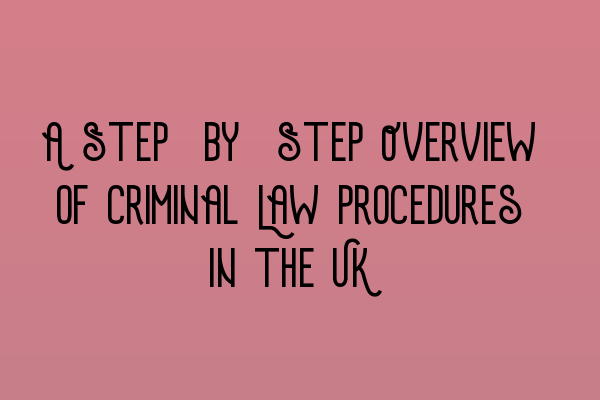A Step-by-Step Overview of Criminal Law Procedures in the UK
Welcome to SQE Criminal Law & Practice Law UK! Our team of expert solicitors is here to provide you with a comprehensive overview of criminal law procedures in the UK. Whether you are a law student or just interested in understanding how the criminal justice system works, this article will guide you through the process step-by-step.
1. Investigation and Arrest
When a criminal activity is reported, law enforcement agencies initiate an investigation. This involves gathering evidence, interviewing witnesses, and collecting any other relevant information. If the authorities have sufficient evidence to suspect someone of committing a crime, they may make an arrest. To learn more about the investigative process, you can refer to our article on SQE 1 Practice Mocks FLK1 FLK2.
2. Charging and Bail
After an arrest, the police may charge the suspect with the alleged crime. The suspect is then brought before a court, where they can apply for bail. Our SQE 2 Preparation Courses offer in-depth information on the different types of bail and the procedures involved.
3. Pre-trial Procedures
Before a criminal trial begins, there are several pre-trial procedures that take place. These include the exchange of evidence between the prosecution and defense, case management hearings, and the possibility of plea negotiations. To understand these procedures better, you may find our SQE 1 Preparation Courses useful.
4. Criminal Trial
The criminal trial is the stage where the prosecution presents their case against the accused. The defense has the opportunity to challenge the evidence and present their own case. The trial concludes with the judge or jury reaching a verdict. To prepare for the criminal trial, it is crucial to practice your legal knowledge. You can test your skills with our SQE 1 Practice Exam Questions.
5. Sentencing and Appeals
If the accused is found guilty, the court proceeds to sentencing. Sentencing can include fines, community service, probation, or imprisonment. In some cases, the accused may choose to appeal the verdict. Understanding the appeals process can help you navigate this stage effectively. For more information on sentencing and appeals, you can refer to our article on SRA SQE Exam Dates.
By following this step-by-step guide, you now have a clearer understanding of the criminal law procedures in the UK. If you have any further questions or require legal assistance, don’t hesitate to reach out to our team of expert solicitors at SQE Criminal Law & Practice Law UK.
